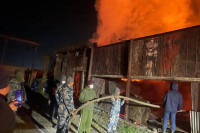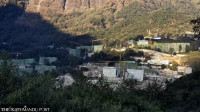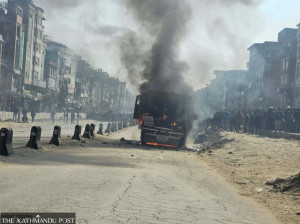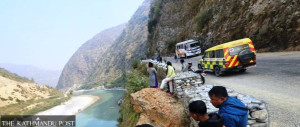Bagmati Province
Bagmati Chief Minister Jamkattel wins trust vote after deal with Unified Socialist
The CPN (Unified Socialist) has been promised leadership of two provinces in return for backing Jamkattel.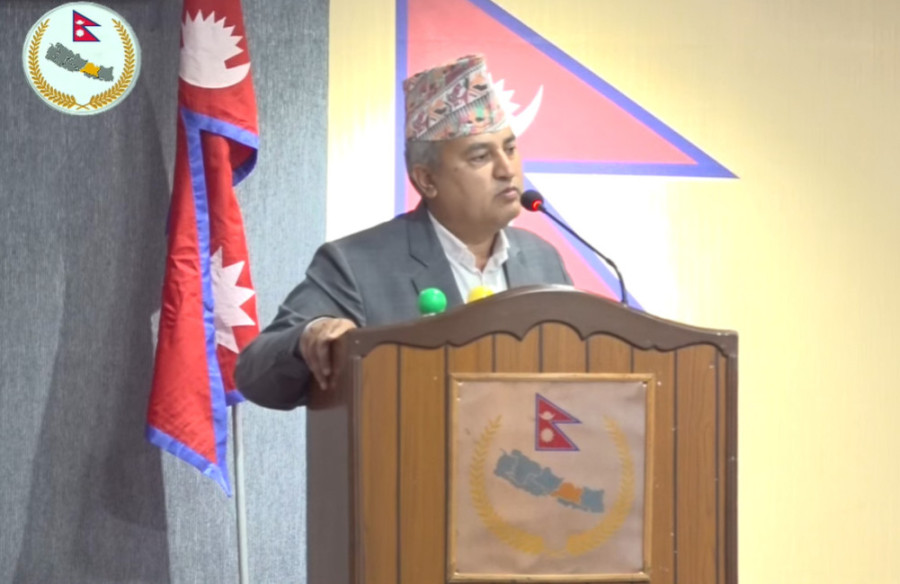
Subash Bidari & Arjun Shah
The CPN (Unified Socialist) has made the major coalition partners agree to allow the fringe party to lead two provincial governments.
The major political forces—the CPN-UML and the CPN (Maoist Centre)—accepted the Unified Socialist leadership in Bagmati and Sudurpaschim after Shalikram Jamkattel’s government was pushed into a crisis. This happened after the Unified Socialist refused to give Jamkattel, a Maoist Centre leader, a trust vote on Monday without first ensuring chief ministerial berths in two provinces.
Before the start of the trust vote in Hetauda, coalition partners signed a power sharing deal in Kathmandu. The meeting of coalition partners held at the Prime Minister’s official residence in Baluwatar decided to form a provincial government in Sudurpaschim under the leadership of the Unified Socialist. Similarly, the Unified Socialist will also lead the provincial government in Bagmati in the second phase on a rotational basis.
“As per the decision reached at today’s meeting, the Unified Socialist will immediately form the government in Sudurpaschim while the party will lead the provincial government in Bagmati in the second phase,” said Unified Socialist’s senior leader Jhala Nath Khanal.
The Unified Socialist, which couldn’t become a national party in the federal parliament after failing to cross the three percent vote threshold in the 2023 elections, has succeeded to secure two ministerial berths in Pushpa Kamal Dahal Cabinet and ensure two chief ministerial positions, among other ministerial portfolios in other provinces.
Following the fresh power deal, Jamkattel won the trust vote. He needed the support of 56 assembly members to prove a majority in the 110-strong provincial assembly. Chief Minister Jamkattel garnered just the required number of votes while 37 votes were cast against him. Other 15 members stayed neutral.
Twenty seven members of the UML, 21 of the Maoist Centre, seven of the Unified Socialist and a member of the Hamro Nepali Party voted for Jamkattel. Thirty-seven members of Nepali Congress voted against the government while 15 from Rastriya Prajatantra Party and those from Nepal Workers and Peasants Party stayed neutral. Also, a member of the Hamro Nepali Party, which is in the government, abstained.
The ruling alliance in Kathmandu had to strike the fresh power sharing agreement after the Unified Socialist on Sunday decided not to support Jamkattel in the trust voting on Monday under ‘current circumstances’.
Chief Minister Jammakattel inducted UML’s Jagannath Thapaliya into his Cabinet as the Minister for Economic Affairs and Planning of the province.
Earlier on Friday, he had appointed Shailendraman Bajracharya, a member of the Hamro Nepali Party, as the provincial minister for culture, tourism and co-operatives.
After the changes in the ruling coalition at the centre a month ago, the Nepali Congress withdrew its support to the Bagmati government.
The UML holds 27 seats, the Maoist Centre has 21 members, and the Unified Socialist seven seats in the 110-member provincial assembly.
With 37 members, the Congress is the largest party in the provincial assembly. Likewise, the Rastriya Prajatantra Party has 13 members, the Nepal Workers and Peasants Party has three and the Hamro Nepali Party has two members in the assembly.
After Monday’s power sharing agreement at the centre, the Unified Socialist is gearing up to form the provincial government in Sudurpaschim. Provincial party leader of the Unified Socialist Dirgha Bahadur Sodari has intensified efforts to become chief minister.
Currently, the Nepali Congress provincial assembly leader Kamal Bahadur Shah leads the Sudurpaschim government. He was appointed chief minister in February last year. In the 53-member assembly, the Congress has 19 members, the Unified Socialist has three and there is one independent lawmaker. Likewise, the UML has nine members, the Maoist Centre 10, the Nagarik Unmukti Party seven, and the Rastriya Prajatantra Party has one lawmaker.
The support of at least 27 assembly members is needed to form the government in Sudurpaschim. Sodari is almost certain to secure support of 10 members of the Maoist Centre, nine of the UML and an independent member. However, he needs the support of two more members to form the government.
The party now should get support from the Nagarik Unmukti Party, which is sharply divided on whether or not to support the incumbent government led by Congress leader Shah.
Of the seven members of the Nagarik Unmukti Party, five are close to the party’s patron Reshamlal Chaudhary who is in favour of supporting the present Congress-led government while two members considered close to party Chairperson Ranjita Shrestha are against Shah’s government.
Sodari needs the support of at least two members of Nagarik Unmukti Party. “All seven members of Nagarik Unmukti Party will support us to form a new government,” said a Unified Socialist province assembly member.




 18.12°C Kathmandu
18.12°C Kathmandu





